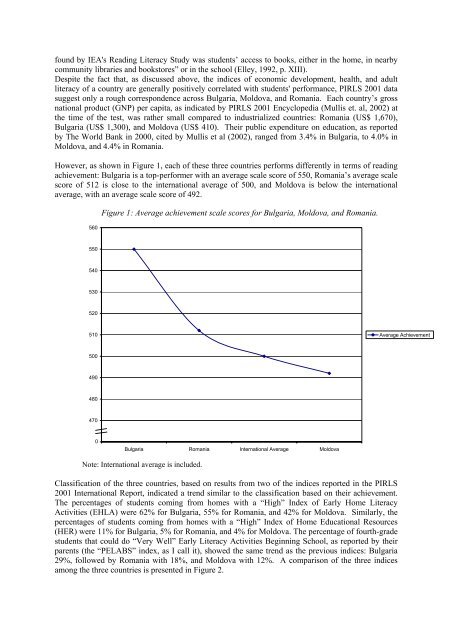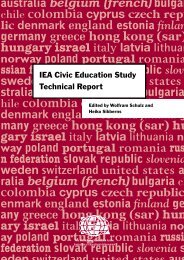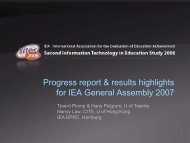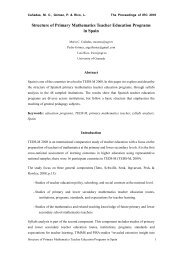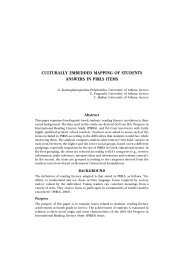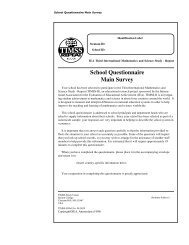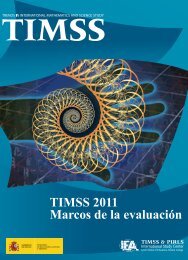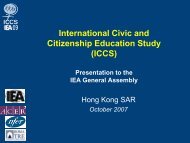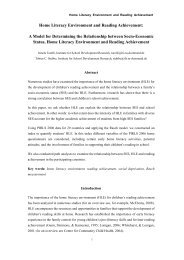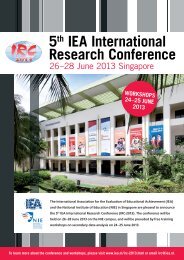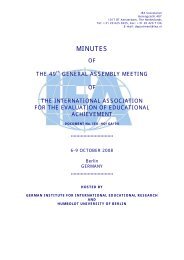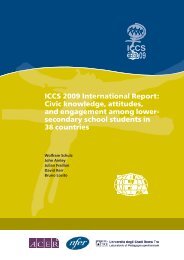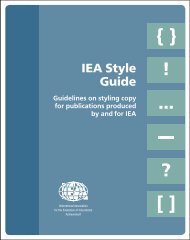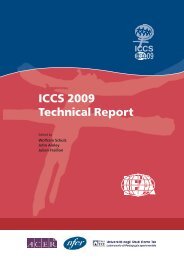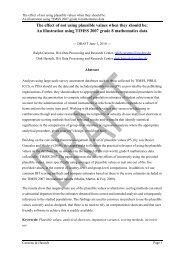THE EFFECTS OF EARLY LITERACY ACTIVITIES UPON ... - IEA
THE EFFECTS OF EARLY LITERACY ACTIVITIES UPON ... - IEA
THE EFFECTS OF EARLY LITERACY ACTIVITIES UPON ... - IEA
Create successful ePaper yourself
Turn your PDF publications into a flip-book with our unique Google optimized e-Paper software.
found by <strong>IEA</strong>'s Reading Literacy Study was students’ access to books, either in the home, in nearby<br />
community libraries and bookstores” or in the school (Elley, 1992, p. XIII).<br />
Despite the fact that, as discussed above, the indices of economic development, health, and adult<br />
literacy of a country are generally positively correlated with students' performance, PIRLS 2001 data<br />
suggest only a rough correspondence across Bulgaria, Moldova, and Romania. Each country’s gross<br />
national product (GNP) per capita, as indicated by PIRLS 2001 Encyclopedia (Mullis et. al, 2002) at<br />
the time of the test, was rather small compared to industrialized countries: Romania (US$ 1,670),<br />
Bulgaria (US$ 1,300), and Moldova (US$ 410). Their public expenditure on education, as reported<br />
by The World Bank in 2000, cited by Mullis et al (2002), ranged from 3.4% in Bulgaria, to 4.0% in<br />
Moldova, and 4.4% in Romania.<br />
However, as shown in Figure 1, each of these three countries performs differently in terms of reading<br />
achievement: Bulgaria is a top-performer with an average scale score of 550, Romania’s average scale<br />
score of 512 is close to the international average of 500, and Moldova is below the international<br />
average, with an average scale score of 492.<br />
560<br />
Figure 1: Average achievement scale scores for Bulgaria, Moldova, and Romania.<br />
550<br />
540<br />
530<br />
520<br />
510<br />
Average Achievement<br />
500<br />
490<br />
480<br />
470<br />
4600<br />
Bulgaria Romania International Average Moldova<br />
Note: International average is included.<br />
Classification of the three countries, based on results from two of the indices reported in the PIRLS<br />
2001 International Report, indicated a trend similar to the classification based on their achievement.<br />
The percentages of students coming from homes with a “High” Index of Early Home Literacy<br />
Activities (EHLA) were 62% for Bulgaria, 55% for Romania, and 42% for Moldova. Similarly, the<br />
percentages of students coming from homes with a “High” Index of Home Educational Resources<br />
(HER) were 11% for Bulgaria, 5% for Romania, and 4% for Moldova. The percentage of fourth-grade<br />
students that could do “Very Well” Early Literacy Activities Beginning School, as reported by their<br />
parents (the “PELABS” index, as I call it), showed the same trend as the previous indices: Bulgaria<br />
29%, followed by Romania with 18%, and Moldova with 12%. A comparison of the three indices<br />
among the three countries is presented in Figure 2.


